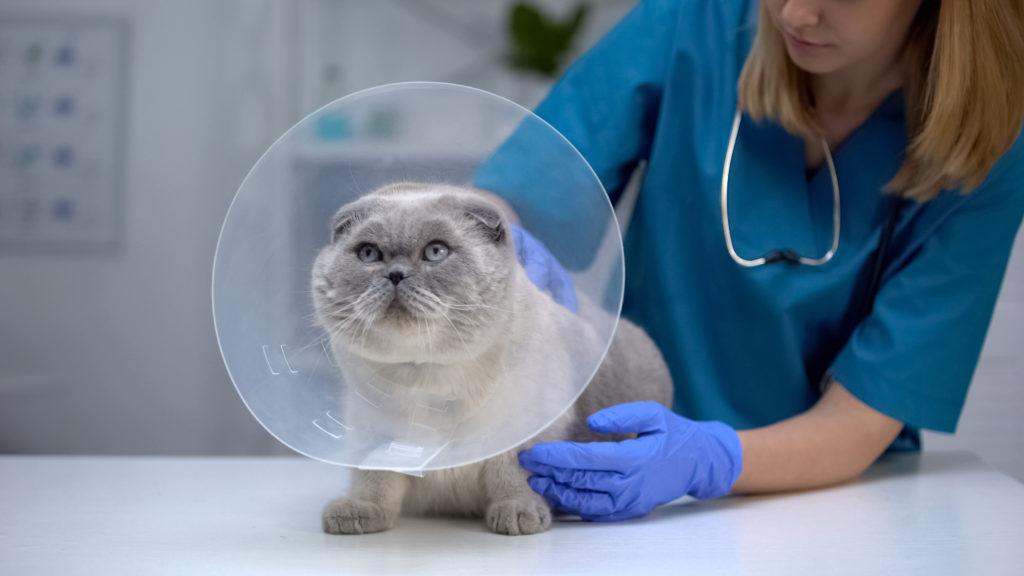Has Your Cat Been Spayed or Neutered?
This month, we’re going to explain the importance of spaying and neutering for cats. There are many, many benefits to spaying and neutering your cats. We know how much you love your cat and want the best for their health. We’ll dive in more to the health issues later. However, it’s important to know that cancer and other health issues may occur without having your kitty spayed or neutered.
The ASPCA reminds us that it’s possible to spay and neuter kittens as young as eight weeks old. Your veterinarian can discuss the right age and any requirements for spaying and neutering once you make the initial appointment. If you adopt a kitten or cat, most shelters will spay or neuter them before they are available for adoption.
We’re going to explore the health benefits of spaying and neutering and how to keep your cat healthy and safe. Our veterinarians know how important your pets are to you. We work to educate cat owners to make sure their cats are as healthy as can be.
Having Your Cat “Fixed” Is Better for Their Health
Many cat owners know of spaying and neutering as getting their cat “fixed.” Did you know that this procedure is better for your cat’s health and behavior, too? The ASPCA article above mentions some of the important benefits for your cat, including:
Preventing cancer in both male and female cats. Spaying and neutering can decrease infection and cancer by 90 percent in cats.
Female cats won’t go into heat. Female cats go into heat roughly every three weeks during breeding season. By spaying your female cat, they will not feel this discomfort, and you may notice a decrease in urination.
Male cats won’t mark (in most cases). Male cats tend to mark by spraying urine. If your cat lives indoors, you may notice strong urine smells or stains. In most cases, neutering will put a stop to this. If not, there may be another issue at hand.
Combat aggression. Some cats may have aggression or territorial problems. Spaying and neutering all of your pets can help to eliminate these problems.
Do you see the importance of spaying and neutering for your cats? Then it’s time to make an appointment at Veterinarians to Cats in Roanoke, VA.
How to Approach Spaying or Neutering a Stray Cat
You may know of people who have caught stray cats to spay or neuter them. Many people know that stray cats can cause an influx of kittens. Feral, stray cats can move into neighborhoods and live under or in buildings and other safe spaces. They can then mate and bring in many kittens. According to the Animal Rescue Professionals Association, cats can have around 12 kittens, or three litters, per year. This means that more and more stray cats will populate your neighborhood as these kittens grow.
If you notice stray cats, the best thing to do is to call your local shelter or veterinarian. Professionals can then come and remove the cats to have them spayed or neutered. Be cautious on trying to get stray cats on your own. They may scratch or bite, causing infection. The shelter staff or other professionals can safely remove the cats, allowing them to receive proper vet care.
Help Your Cat to Heal After Surgery
As with any person or animal going through surgery, there are some things to do to make sure they heal. Your kitty may be tired when they get home from anesthesia. Be sure that they have a safe place to sleep and rest. Separating them from other pets is the best way to do this while keeping them safe. Be sure to keep an eye on the incision site to make sure it’s healing properly. If you notice any prolonged swelling, redness, or bleeding, call your veterinarian.
Limit hard playing, including running and jumping. Your cat needs time to heal, and this moving can prevent that. The veterinarian will give you directions on when to resume playing and normal behavior.
Most cats may come home with a cone around their necks to avoid licking the incision site. Make sure to keep this on to avoid licking and irritation to the site. If they do not do well with the cone, ask your veterinarian for other options.
What Happens If You Don’t Spay or Neuter Your Cat?
As we mentioned above, spaying and neutering can help to prevent cancers, infections, and behavioral issues. If you do not go through with spaying or neutering your pets, they have an increased risk for:
- Bladder/uterine infections
- Uterine or testicular cancer
- Prostate issues
- Breast tumors
- Aggression
- Increased urination
Spaying and neutering, when done by a professional, is a very safe procedure. Speak with your vet to learn more about the many benefits. The team at Veterinarians to Cats in Roanoke will be happy to discuss spaying and neutering and schedule an appointment.
Veterinarians to Cats Explains the Importance of Spaying and Neutering
Veterinarians to Cats in Roanoke, VA, offers spaying and neutering for cats throughout the area. Do you have a new kitten or rescue cat that needs spayed or neutered? Make an appointment with us today. Our friendly staff will be happy to meet you and your kitty. We offer a full range of feline vet care and surgery options.
Are you looking for a new veterinarian for your cats? Call Veterinarians to Cats in Roanoke, VA, at (540) 989-1400 or follow us on Facebook for updates. Talk to our veterinarians about the importance of spaying and neutering.

